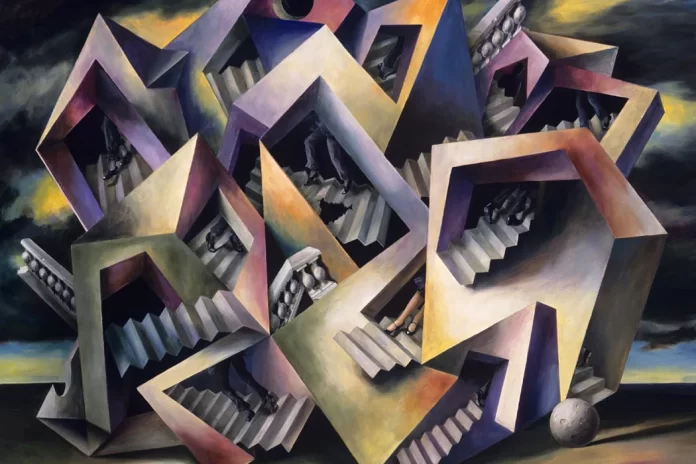In both Kafka’s novel and Pakistan, the concept of power dynamics plays a significant role. The Trial presents a faceless, all-powerful court system where the accused is left grappling with an enigmatic and impenetrable authority
Literature has a remarkable ability to reflect and comment on the realities of society, even transcending time and geographical boundaries. Franz Kafka’s renowned novel, “The Trial,” written in the early 20th century, delves into themes of bureaucracy, power dynamics, and the individual’s struggle against an oppressive system. Surprisingly, when we examine the current situation in Pakistan, we find intriguing parallels between Kafka’s fictional world and the challenges faced by individuals within the country’s socio-political landscape.
The Trial” revolves around the protagonist, who finds himself caught in an incomprehensible legal system where he is accused of an unspecified crime. Similarly, in Pakistan, many individuals nowadays are encountering a bewildering web of bureaucracy and legal complexities which is hindering their pursuit of justice. Kafka’s novel highlights the frustration and helplessness experienced by the individual., mirroring the experiences of Pakistani citizens who navigate a convoluted legal system characterized by delays, corruption, and a lack of transparency.
In both Kafka’s novel and Pakistan, the concept of power dynamics plays a significant role. The Trial presents a faceless, all-powerful court system where the accused is left grappling with an enigmatic and impenetrable authority. In Pakistan, the influence of faceless power dynamics is evident in various spheres of society, from politics to governance. The concentration of power often leads to a sense of impunity among those in positions of authority, creating an environment where accountability becomes elusive, and justice is compromised.
Similarly, many Pakistanis struggle to navigate the complexities of poverty and its multifaceted consequences. The soaring inflation rates exacerbate the economic burdens faced by marginalized communities, pushing them deeper into poverty. The absence of transparent economic policies, coupled with corruption and mismanagement, contributes to a sense of helplessness and frustration among the most vulnerable segments of society.
One of the underlying themes in “The Trial” is the existential struggle of the individual against an oppressive system. This struggle resonates with the challenges faced by individuals in Pakistan who strive for basic rights, freedoms, and socio-economic opportunities. Whether it is marginalized communities, activists, or dissenting voices, many individuals find themselves navigating a complex web of societal norms, cultural expectations, and oppressive structures that limit their ability to exercise agency and voice their concerns.
The parallels between Kafka’s novel and the current situation in Pakistan become even more apparent when considering the issue of crime. In “The Trial,” Josef K. faces an ambiguous accusation, trapped within a system where the boundaries of guilt and innocence are blurred. Similarly, Pakistan grapples with a high crime rate, encompassing various forms of violence and criminal activities. The lack of effective law enforcement, coupled with corruption and a fragile justice system, often leads to impunity for criminals and a sense of insecurity among the populace.
Additionally, “The Trial” delves into the theme of oppression faced by individuals who dare to challenge the system. Josef K.’s futile attempts to question the system’s authority mirror the struggles of those who raise their voices against wrongdoing and corruption in Pakistan. Activists, journalists, and individuals advocating for social justice are often subjected to intimidation, threats, and even torture. The suppression of dissent and the stifling of voices that seek accountability contribute to a climate of fear and inhibit efforts to address the systemic issues that perpetuate poverty and crime.
Kafka’s novel also explores the theme of alienation, where Josef K. finds himself isolated and estranged from the society around him. In a similar vein, some individuals in Pakistan experience a sense of alienation due to social, economic, or cultural disparities. Marginalized groups, such as religious minorities or those living in poverty, often face discrimination, prejudice, and limited access to resources, leading to a sense of detachment from the broader societal fabric.
Moreover, a key lesson that can be drawn from both “The Trial” and the current situation in Pakistan is the importance of institutions working within their own domains rather than interfering in every aspect of society. In Kafka’s novel, Josef K.’s attempts to navigate the legal system without fully understanding its intricacies only lead to further confusion and frustration. Similarly, in Pakistan, individuals and institutions should focus on their areas of expertise and contribute meaningfully within their designated roles. By encouraging specialization and expertise and fostering a culture of collaboration and respect for diverse perspectives, society can harness the collective efforts of individuals working synergistically in their respective domains. This approach allows for a more efficient and effective system that can address the multifaceted challenges of poverty, inflation, crime, and corruption, ultimately leading to a more prosperous and just society.
In conclusion, Franz Kafka’s novel “The Trial” offers a lens through which we can examine and discuss the challenges faced by individuals within the current situation in Pakistan. By exploring themes of bureaucracy, power dynamics, individual struggle, and alienation, we can gain a deeper understanding of the complexities of navigating an oppressive system. Through this reflection, we are reminded of the importance of addressing systemic issues and working towards a more inclusive and just society for all.




